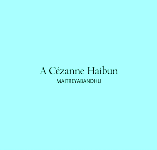Kate Noakes relishes a short sequence by Maitreyabandhu which combines nature writing and memoir
 A Cezanne Haibun
Maitreyabandhu
Smith|Doorstop Books
ISBN 9781912196241
£6
A Cezanne Haibun
Maitreyabandhu
Smith|Doorstop Books
ISBN 9781912196241
£6
Excluded from his forthcoming Bloodaxe collection, After Cezanne, this haibun had found its home, arguably the best place for it, in single pamphlet form. Haibuns, you will recall, are Japanese and supposedly ‘invented’ by Basho in the seventeenth century. They combine prose and haiku, often related to travel as diary or journal, and, as always, including nature and landscape. They are formally arranged as a paragraph of prose followed by a haiku which in some way is a summary or essence of one of the thoughts or ideas in the prose.
In their English form, as here, they are often similar as to subject matter. Maitreyabandhu deftly weaves his re-readings of Cezanne’s letters during a month’s sojourn/retreat in the Sierra Atlantica mountains in Andalucia. Observations of the natural world in which he finds himself appear alongside elements of his own story. Playful with the form – a paragraph or two, a haiku or two, or sometimes a few quatrains – , this is part nature writing, part memoir and is a sequence to relish.
I was especially taken with the letter extracts that he chooses: sometimes gossipy, these are the everyday matters of being an artist, complaining, as well as focussed on the work. Most of all I was impressed by Maitreyabandhu’s candour in relation to his own past loves and familial relationships. And along the way I was astonished by some lovely and surprising imagery for both high ideas and the everyday matter of food:
My favourites included:
‘Two long-tailed tits fluttered in front of me and stopped, then flew away again like pageboys
in a fairy tale.’
‘When the sun comes out it’s like my mother ironing, pressing down on brothers’ shirts and socks.’
‘The rocks tell you everything you need to know about the articulation of light and how each angled
facet is a piano chord struck against the darkness of the world.’
‘Supper out of the paella pan –
olive oil, garlicky.
onions you could
eat like apples…’
Maitreybandhu’s skill here is to render the landscape clearly in all its details: the pine trees, grasses, rocks and stones, as well as the animals and birds, and somehow too, the oppressive sun. It is almost as if the reader is there, at the edge of the canvas, under the shade of an olive tree. As he says to close the sequence:
‘And Cezanne is right of course, we experience nature more in the depth than in surface. Looking up
from my book, I can see he has added vibrations of light in red and yellow, then a sufficient quantity
of blue tones to give the feel of air.’
Apr 10 2019
London Grip Poetry Review – Maitreyabandhu
Kate Noakes relishes a short sequence by Maitreyabandhu which combines nature writing and memoir
Excluded from his forthcoming Bloodaxe collection, After Cezanne, this haibun had found its home, arguably the best place for it, in single pamphlet form. Haibuns, you will recall, are Japanese and supposedly ‘invented’ by Basho in the seventeenth century. They combine prose and haiku, often related to travel as diary or journal, and, as always, including nature and landscape. They are formally arranged as a paragraph of prose followed by a haiku which in some way is a summary or essence of one of the thoughts or ideas in the prose.
In their English form, as here, they are often similar as to subject matter. Maitreyabandhu deftly weaves his re-readings of Cezanne’s letters during a month’s sojourn/retreat in the Sierra Atlantica mountains in Andalucia. Observations of the natural world in which he finds himself appear alongside elements of his own story. Playful with the form – a paragraph or two, a haiku or two, or sometimes a few quatrains – , this is part nature writing, part memoir and is a sequence to relish.
I was especially taken with the letter extracts that he chooses: sometimes gossipy, these are the everyday matters of being an artist, complaining, as well as focussed on the work. Most of all I was impressed by Maitreyabandhu’s candour in relation to his own past loves and familial relationships. And along the way I was astonished by some lovely and surprising imagery for both high ideas and the everyday matter of food:
My favourites included:
Maitreybandhu’s skill here is to render the landscape clearly in all its details: the pine trees, grasses, rocks and stones, as well as the animals and birds, and somehow too, the oppressive sun. It is almost as if the reader is there, at the edge of the canvas, under the shade of an olive tree. As he says to close the sequence:
By Michael Bartholomew-Biggs • books, poetry reviews, year 2019 0 • Tags: books, Kate Noakes, poetry